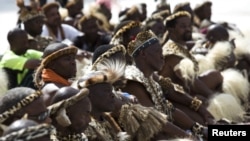South Africans celebrated the 21st anniversary of the country's first fully democratic elections Monday, which saw the late Nelson Mandela voted in as president.
Song, dance and political slogans dominated the events, attended by thousands across the country, which took place at a time when South Africa is experiencing xenophobic violence, high unemployment and continued protests over the lack of basic services.
During his Freedom Day speech, President Jacob Zuma denounced what he termed anger among the people.
Zuma told thousands gathered at the Union Buildings in Pretoria that his government has given millions of citizens access to water, education and health care.
He spent much of his speech denouncing the recent xenophobic violence that left seven people dead and hundreds of foreign nationals displaced.
Zuma hit back at African countries that have criticized South Africa for the attacks. He said they should first ask themselves why their citizens are refugees.
"Much as we can have a problem, our brother countries contribute to this. Why are the citizens not in their countries? Because in a sense everybody then criticizes South Africa, but what prompts these refugees to be in South Africa?"
Regarding the protests over crime and poor services, Zuma called on South Africans to seek help to eliminate simmering public anger, which he said results from the country’s oppressive past.
"There is a lot of anger in our society. We need a psychological cure as a country to drop the anger. It’s not just with the ordinary people, even in parliament we need to be cured, we are sick," he said.
Many South Africans say the protests are really about being left out of the country’s economic progress, which they say is largely benefiting the political elite.
South Africa's unemployment rate is currently 24 percent, and more than 10 million of the country’s 54 million people are living below the poverty line.
Young people also complained about the cost of education, which is now nine percent higher compared to a year ago.
Twenty-eight-year-old Solly Mavuso said if politicians do not respond to these challenges, citizens will resort to violence.
"Lots of youths are not working. Some of them they come from tertiary [school] but they are sitting at home, they are not working. We believe that we musn’t just speak, but we must do something about the youth," Mavuso said.
Zuma promised that his government will work hard to end the feeling of hopelessness and frustration among South Africa's young people and the poor.




